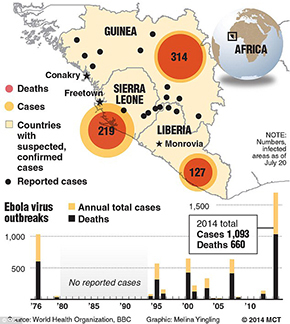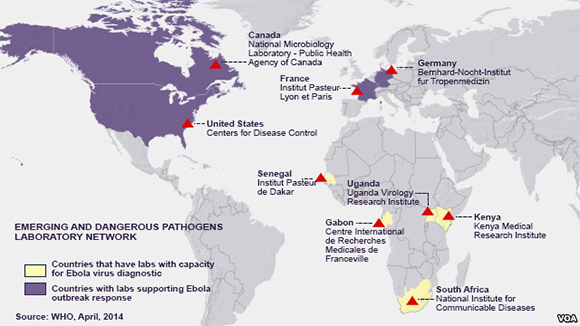by Thadeus Pato
September 6, 2014
The problem
The Ebola Virus is not a new discovery. It is named after the river Ebola in Congo, on whose banks it was discovered in 1976. This first epidemic there caused about 300 fatalities. Since then there were repeated outbreaks of the disease in different African countries, the last biggest ones 2007 in Uganda and again in the Democratic Republic of Congo. The Ebola virus basically is not very problematic from an epidemiological point of view. Transmission works exclusively through the contact with the body fluids of the infected persons or animals – in contrary to the influenza virus for instance, which can also be transmitted though air – so it is relatively easy, to protect oneself.

Additionally the virus is very sensitive to environmental influences, it dies immediately outside body fluids, and cannot penetrate skin which doesn’t have lesions , but enters exclusively through the mucous membranes (i.e. mouth, nose, eyes) or through open wounds. If this virus was as contagious as the influenza virus is, we had to count with hundreds of thousands of cases already.
But the virus nevertheless is dangerous, because the mortality of the infected population is very high – depending of the genotype of the virus between 50 and 80% – and because so far a reliable remedy or a vaccination are not available.
Actually the virus, a so-called RNA-virus, is not “made“ for human beings. No germ, virus or parasite kills such a high percentage of its host and so quickly – it likes to multiply, not to die out. The original hosts of the viral agent are most probably certain species of bats – the transmission to human beings and certain wild animals like antelopes or monkeys is basically a kind of “accident“.
The protection against a transmission between people, as we have mentioned, is basically quite simple. This is one of the reasons, why the past epidemics had been limited and contained quite fast.
Epidemic and sociopolitical situation
Why did the Ebola virus did spread so rapidly across West Africa, after the outbreaks of the disease in the past have been relatively limited? There are number of reasons, which have not much to do with the virus itself, but a lot with the situation in the respective countries. Generally one can say, that epidemics are spreading in poor (and densely populated) countries much easier and faster. Liberia is in the HDI (Human Develoment Index) on number 174, Sierra Leone on 177, Guinea on 178, and Nigeria, where the situation still is (more or less) under control, on 153.
Firstly, medical infrastructure is not very reliable. In Sierra Leone after the civil war between 1991 and 2002 the medical system was almost completely destroyed and in some parts of the country simply doesnt exist. The situation in Liberia is similar.
Secondly, certain suggestions of preventive measures fall on deaf ears in the population – and not without reason. If one wants to impede the consumption of so-called bush meat ie of wild animals including bats, which are a major means of transmission of the virus, education and recommendations wont have any effect, as long as the people do not have affordable alternatives to feed themselves. This is the case especially in remote areas.
Thirdly the level of education plays a very important role in the fight against any epidemic. And this level is very low in all of the affected areas. That promotes all sorts of myths, in the best case senseless ones, in the worst dangerous ones.
In Nigeria for example in the beginning of August, after the first cases (imported from Liberia to Lagos) occurred, a recommendation was spread through social media, to bathe in salt water and to drink it as a measure of protection against Ebola. In spite of immediate official denials lots of people believed it and did so. The result was numerous hospital admissions because of severe diarrhoea and at least one death.
The case of the Nigerian minister of health, Prof. Chukwu, proves that even responsible officials are affected by all kinds of wrong information: He announced publicly on August 15, that Nigeria would import a „new drug“ against Ebola. It turned out, that this was simply so-called “Nano Silver“ (in the Nigerian press written “Nano Silva“), a substance, which is presently used as surface coating for washing machines and as additive in clothes, for instance socks, to kill bacteria, but is completely useless respecting the treatment of a systemic viral disease.
Fourthly – and this is to be seen in context of the previous point – a big part of the population simply does not trust the announcements of the authorities, and there are good reasons for that, as we have just proved.
Fifthly the necessary measures to fight the further spread of the disease (i.e. isolation, quarantine, restrictions of mobility) are not or not sufficiently implementable for various reasons. Besides the lack of infrastructure, the (already mentioned) desperate condition of the health facilities and the common mistrust, widespread corruption is playing a key role, especially in Nigeria: Border restrictions put in place to prevent the spread of the virus can be bypassed by bribery.

And sixthly the mortality rate amongst people with a particular disease is generally higher in poor countries. The question whether somebody can survive Ebola depends not only on the virus, but crucially on the state of someone‘s immune system, that is on the power of resistance of the individual. If you imagine, that the average life expectancy for instance in Sierra Leone is between 48 and 49 years, and the infant mortality rate 159 out of 1000 births, it becomes clear, that the virus is particularly lethal amongst such a weakened and undernourished population .
Racism
If we consider the way the so-called international community is dealing with the present Ebola-epidemic, one can`t resist the impression that racism is playing a central part. Affected foreigners are not treated like the local population – the latter have to stay in the local, underequipped facilities and is not evacuated to special units in North America or Europe. The recently released experimental therapies are only available in limited quantities and therefore is to ask the question of distributive justice – if they really work.
Anyway the pharmaceutical industry took a chance. It had a unique possibility, to bypass the usually necessary long testing procedures before the release of a new drug, and to start large-scale experiment on human beings; immediately starting the machinery of production. Whether this will be helpful in combatting the virus is questionable. First, practically all (working) antiviral drugs have a considerable potential for side-effects, and secondly, it would not be the first time (remember the scandal around so-called swine-flu), that such a strategy causes more damage than benefit. But in any case it will be good for profits!
The same applies to the development of a vaccine, which until now was happening very slowly – given that the main target group is not very solvent at all. But now the international guild of professional helpers from the Red Cross and the World Health Organisation (who have their own interests which are not only humanitarian) raised the alarm, donations are rising rapidly.
This does not mean that it would be better to do nothing. But the present emergency measures, the legions of helpers and epidemiologists who are now dealing with the problem, will not change anything about the above mentioned reasons for these kinds of disasters. And therefore before and after the epidemic many more people will die as result of the consequences of simple, treatable diseases, malnourishment and lack of hygiene, than of Ebola.
Notabene: Ignorance, hunger and malnourishment have a decisive disadvantage compared to a virus disease: They are not contagious and so they cannot be imported by plane to Europe or North America. Otherwise they would be fought as fast and consequently like it is done presently with the Ebola virus……
Thadeus Pato is a leading member of the German RSB (Revolutionär Sozialistischer Bund – one of the Fourth International organisations in Germany) and member of the Bureau of the Fourth International. He is a hospital doctor.
